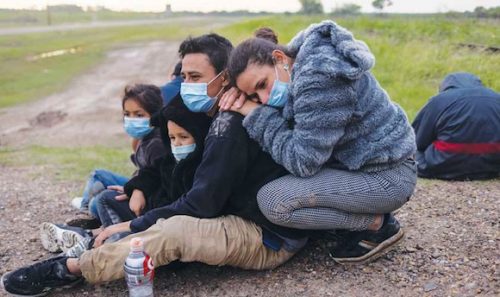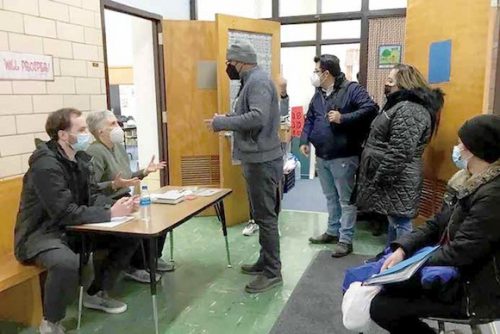Since autumn 2021, Central Minnesota has become home to about 70 Nicaraguan single adults and families. The organization Fe y Justicia MN (Faith and Justice MN) is helping them navigate community resources.

Fe y Justicia is a faith-based, Latino-led organization that strives “to bring justice and provide kindness and compassion” to communities in Central Minnesota. It has members in Big Lake, Cold Spring, Little Falls, Long Prairie, Melrose, Perham, Richmond, Rockville, St. Cloud and Waite Park. Ma Elena Gutiérrez, director of Fe y Justicia, has worked on immigration issues for many years. She isn’t sure why this influx of Nicaraguans is coming to Minnesota.
“Every year some Nicaraguans arrive, but these Nicaraguan immigrants came directly here,” Ma Elena said. “Often newcomers have friends or family members already in the area. These asylum-seeking immigrants didn’t — and that surprised us. They are our neighbors and need our support and places to live where they are safe and protected. We expect more immigrants to come here because many, including children and Venezuelans, wait in detention centers.”
Perla Ramos, a Fe y Justicia organizer, focuses on health concerns, filing asylum applications and other issues.
[perfectpullquote align=”left” bordertop=”false” cite=”” link=”” color=”” class=”” size=”14″]How to assist the Nicaraguan asylum community
- Donate money: Contact Ma Elena Gutiérrez at 106 7th Ave. N., Waite Park, MN 56387. Donate online through fjmn.org or NavigateMN.org.
- Donate household items in good condition: Contact Perla Ramos at perla@unidos-mn.org. Send photos of the items, which she will post so the Nicaraguans can choose.
- Spanish-speakers are needed for support at asylum and medical clinics in Long Prairie and Waite Park. Volunteers are needed to organize forms. Visit Fe y Justicia MN on Facebook for current information. [/perfectpullquote]
“Our newcomers tell painful stories, from sexual abuse and fear of drug cartels to the corrupt government,” Perla said. “People were persecuted and abused and threatened for opposing their country’s major political party and wanting a better future for their families. Some weren’t allowed to work or vote. In emigrating, they’ve spent months in jails or detention centers. Some were treated badly in jails, while others became ill or were hurt on the way. Many friends didn’t make it, so the newcomers feel lucky to be here — [including] one family who can’t explain to their 5-year-old daughter why they fled and why she can’t play with her friends.”
“One woman, about age 21, came after her father disappeared,” Ma Elena said. “He had defended the rights of local people. For two years, she couldn’t find information about him — or his body. Without his protection, she feared for her life, needed to move often and then couldn’t get a job.
Another person, a young man, “told us he and his friends had protested against the government, which turned tear gas and guns on them, killing some of his friends,” Ma Elena said. “Because he’d spoken to the media, the government was searching for him — he had to run. Another young man that I saw at the library had just arrived and didn’t know where to get help. He was trying to translate documents with his phone.”
Patty Keeling, lead Fe y Justicia organizer and parishioner at St. Joseph in Waite Park, was moved by a man’s photographs of his ruined coffee bean farm; climate disruption has cost him his livelihood.
GARNERING COMMUNITY SUPPORT
Nicaraguans coping with family separation, a foreign language, an unfamiliar culture and their first Minnesota winter are being assisted by Fe y Justicia.
“Our quilters at St. Joe, Waite Park, offered quilts from twin- to queen-size, and each person selected what they wanted. The Knights of Columbus generously set aside warm winter coats and let households choose hats, gloves and boots,” Patty said.
“After registering families at Catholic Charities’ food shelf, we picked up boxes with enough food for a couple weeks. Fe y Justicia volunteers helped distribute them. Until households can establish themselves, we’ll walk them through the process of setting up appointments,” she added.
Fe y Justicia holds monthly health clinics in Waite Park and Long Prairie.
“Doctors and nurses have volunteered to see newcomers with serious conditions but who aren’t yet able to pay for office calls. Many need medical attention before their situations get worse,” Ma Elena said.
ASYLUM A STEP TOWARD INDEPENDENCE

Once basic needs are met, applying for asylum is the next step. Jobs, driver’s licenses and other resources cannot be accessed until the paperwork is complete and accepted, so Fe y Justicia pairs with senior law students focusing on immigration law at the James H. Binger Center for New Americans at the University of Minnesota as well as The Advocates for Human Rights. They have hosted three clinics where legal advocates help asylum-seekers fill out necessary applications for free.
Since November, 40 Nicaraguan households have attended the clinics, Ma Elena said; 85% were asylum seekers. Other newcomers needed information to help heal from human trafficking.
“It’s difficult for people who have just arrived or left without papers or don’t have them in order,” Ma Elena said. “We educate them to answer questions a judge will ask. The process of asylum takes years, but after six months they have the possibility to apply for work permits. We hope that by having a work permit, they can find a job and save money to get a lawyer to complete the process. We also educate them to know their rights.”
“Newcomers need practice telling their stories so lawyers help them focus on the most relevant elements that promote their cases the best,” Patty added. “Some people’s paperwork has been sent back due to errors, others have court dates and a few have completed the asylum application. Only then can people can get work permits.”
“People who’ve left their country have nothing,” Perla said. “They meet other immigrants in the same situation and support each other, sharing a car for rides to church or grocery stores, to get clothes, vaccines or medical treatment.”
“Our new neighbors are eager to be independent — they want to pay rent and whatever they can,” Patty said. “They aren’t given very much, so many live crowded together in small apartments or mobile homes. Not everyone has a bed to lay their head on. They still need pillows and sheets as well as clothing, towels, dishes and cooking utensils. Few are bilingual so they’ll start English language classes once they have a work schedule.”






















Hello to whom it may concern, I am a local realtor out of Maple Grove, MN. I am Nicaraguan and I work with other professionals from Nicaragua and we are looking for ways to help. We want to start a coat donation among other things like food and potentially transportation. Who do I need to connect with? Thank you
THIS IS very well written with important information about our sisters and brothers from Nicaragua. Thanks. Sr. Pat Forster
Titatic work Faith and Justice is doing in the area. It is also great that organizations like Centracare, Lutheran Social Services and Stearns county have been the best partners and allies to work for the Hispanic community and put a huge effort to help the Nicaraguan group. Community Health Workers and RNs from Centracare that are not volunteers but employees, are part of a big team working to keep the Hispanic clinic running and referring individuals to other services Faith and Justice provide. We grow together trying to build a better community.
We work together. We need each other because the community has multiple and big struggles.